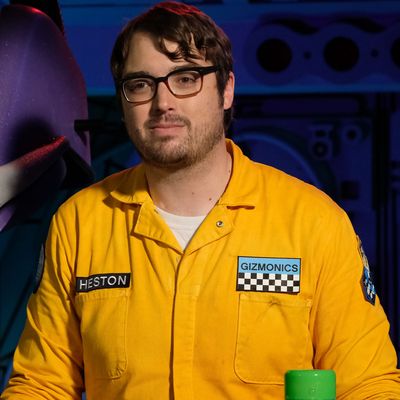
When you sit down with Mystery Science Theater 3000 creator Joel Hodgson and the showÔÇÖs new host Jonah Ray, you feel like youÔÇÖre in the presence of a comfortable buddy duo. Although the two comedians have known each other for only a few years, theyÔÇÖve quickly translated their instant rapport into Mystery Science Theater 3000: The Return, NetflixÔÇÖs much-anticipated (and Kickstarted) revival of the beloved cult hit.
Despite that comfortable chemistry, Ray and Hodgson are not of the same age: Ray is 35, while Hodgson just turned 57. That difference is striking, given how much time has passed since Hodgson hosted MST3K, and the fact that Ray grew up watching his show on Comedy Central. Ahead of MST3K: The ReturnÔÇÖs premiere on April 14, Vulture talked with Hodgson and Ray about what itÔÇÖs like to write jokes, work with (ro)bot puppets, and make fun of really bad movies together.
WhatÔÇÖs your collaborative process like? How do you two work together on jokes?
Jonah Ray: It starts off as a silly aside.
Joel Hodgson: Yeah, itÔÇÖs just playful. You have to have a real buoyant attitude because itÔÇÖs not actual fun to mechanically write. ItÔÇÖs mostly playfulness, and goofing around, and thinking something will come of it. The whole point is to amuse each other.
Ray: And mutual massages.
Jonah, what kind of advice did Joel give you before the MST3K Rifftrax reunion?
Hodgson: I think we had already made the show already, hadnÔÇÖt we?
Ray: No, we hadnÔÇÖt. We were still writing at that time. I had done live riffing before with Doug Benson, but thatÔÇÖs not the same. This was in the context of being with everybody from the original show. I was getting really nervous, and JoelÔÇÖs response to me was, ÔÇ£Hey man, re-lax. ItÔÇÖs Minneapolis, people are gonna love it.ÔÇØ
Joel, what was it like to work on concepts for this new season?
Hogdson: One of the big things that happened ÔÇö and I couldnÔÇÖt have anticipated this happening ÔÇö is how many feelings came out after putting Jonah in that situation rather than me. Long story short, I started to realize that I had a lot of unresolved feelings about how hosting the show felt. Nobody really gets how hard it is other than Jonah, and Mike, and myself. ItÔÇÖs way different when you donÔÇÖt have other roles in the show.
Ray: It wasnÔÇÖt just saying the right lines, it was knowing a sleight-of-hand magic trick, how to work a prop we had.
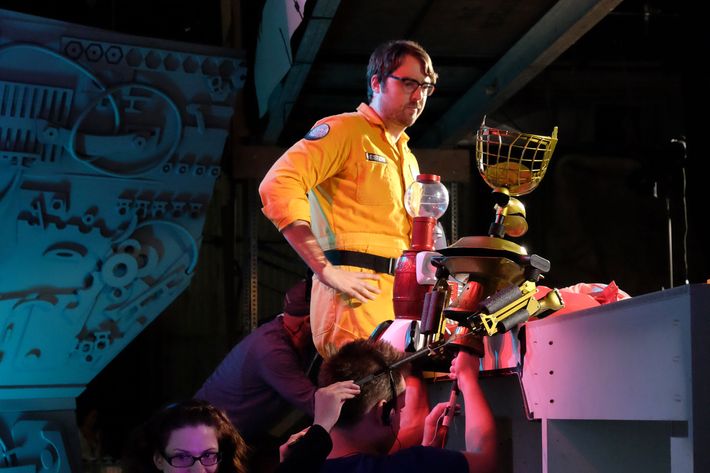
In an interview with Jonah, you said that you once built props in a Minneapolis warehouse that you shared with H├╝sker D├╝. ThereÔÇÖs gotta be a story there, right?
Hodgson: Yeah. I had warehouse space in the Rossmor building in St. Paul. That is the warehouse from the Warehouse: Songs and Stories album. So IÔÇÖd see those guys around, coming and going.
Ray: DidnÔÇÖt you go to one of the record release shows with [comedian] Dana Gould?
Hodgson: Yeah. ItÔÇÖs one of the memories I am most proud of because this is a picture of Dana Gould and I when we were in our 20s. For whatever reason, we decided that we were gonna play air guitar and try to upstage H├╝sker D├╝. We were on the ground and they were up on the stage with lights. But we were doing it so big, trying to upstage them, as silly as that sounds.
LetÔÇÖs talk about the bots. How did those guys end up being the mainstays? As the show has changed, theyÔÇÖve remained the same.
Hodgson: We transitioned piece-by-piece as the show rolled over. Josh Weinstein was the first Tom Servo and Gypsy. He left after the first, so [Kevin Murphy] came in and did Servo, and Jim Mallon did Gypsy. [Puppeteer] Trace Beaulieu stayed on as Crow. Then I left and Mike picked things up. Kevin and Trace were still Servo and Crow. Then Trace left, and [Bill Corbett] came in. So it was a piece-by-piece transition. The roles are always the same, but thereÔÇÖs always three different people. ThereÔÇÖs three different hosts, three different Servos, three different Crows, and four different Gypsies.
Ray: Was there a reason for keeping the bots as they are, do you think? The humans can escape, or become a ball of energy, but the bots are just gonna stay on that satellite.
Hodgson: I didnÔÇÖt put too much thought into it, obviously.
Ray: Should we really just relax?
Hodgson: Yes. But itÔÇÖs also because of Star Wars. I thought I was making Servo look like R2-D2, but I was misremembering since I thought he was red and white, not blue and white. You couldnÔÇÖt go online 30 years ago and search, ÔÇ£What color is R2-D2?ÔÇØ I was just going, ÔÇ£Well, I guess heÔÇÖs red and white.ÔÇØ
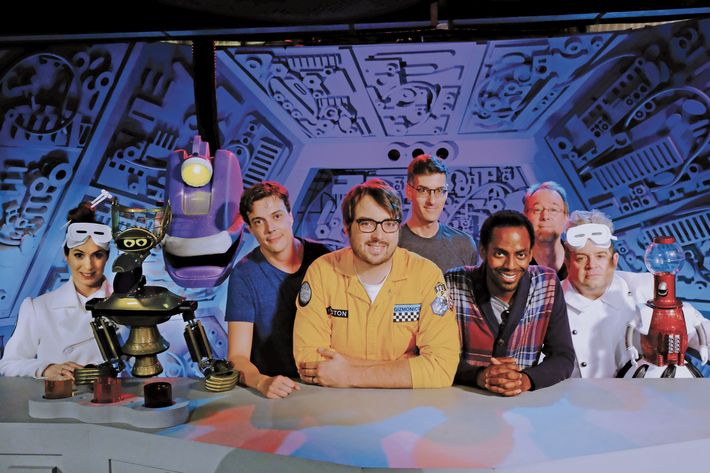
Jonah, how much MST3K did you watch when you were a kid? How devout a fan were you?
Ray: I was pretty avid. I caught it randomly one night on Comedy Central. I remember coming home late one night after seeing a movie, and I turned it on and thought, ÔÇ£Ugh, theyÔÇÖre just replaying old movies? This is dumb!ÔÇØ I was about to turn the channel until I saw the charactersÔÇÖ silhouettes. Then I heard the voices, and I was like, ÔÇ£This is nuts!ÔÇØ There was Joel, this dude I recognized from Letterman. And robots. I was pretty much hooked. I remember trying to describe it to my friends at school the next day, and I remember sounding like a madman.
I watched it every time I could. I taped it, I got my friends into it. I had three different Mystery Science Theater shirts. So yes, I was obsessed with the show. Watching Mystery Science Theater was like watching movies with my friends. Growing up, I made fun of movies with Mystery Science Theater, and I made fun of music with Weird Al Yankovic.
How did you watch the types of movies that appear on MST3K?
Hodgson: I grew up in the ÔÇÖ60s and ÔÇÖ70s, so there were three TV channels. It was really a great moment when any kind of fantasy or horror or monster movie was on TV. It was like winning the lottery. So to me, all these movies were really special when they came on. There were local monster movie shows in Green Bay, where I grew up, and that was really important to me. It spoke to me like an invitation: ÔÇ£You could do that, if you wanted to. You could figure out a way.
Ray: I grew up with cable, so they were there. But when I first got HBO, it was just nonstop horror movies and crappy sci-fi movies. I got really interested in Bela Lugosi. I was 12 when I saw Ed Wood. That flipped me out. I learned everything I could about Ed Wood and Tor Johnson, and it kind of coincided with my obsession with Mystery Science Theater. I would go to the library and check out books about horror movies, or books about movies in general. IÔÇÖd read about it in a book, and then just go to Blockbuster or Video Joe.
How are you selecting your films this time around?
Hodgson: I donÔÇÖt want to talk about it too much, since weÔÇÖre not revealing what the movies weÔÇÖve chosen are. But itÔÇÖs a similar process. The main difference is that the movies are now in widescreen. The biggest problem is finding good prints. TheyÔÇÖre still not great movies, but we have to live with them so much that you donÔÇÖt really want a movie thatÔÇÖs hard to look at. We really do spend a lot of time with them, so we try not to spend time with a movie thatÔÇÖs just physically ugly.
Ray: Without giving too much away, it feels the same. The sound and the vibe, just the feel of these movies ÔÇö it could have been from any time in the showÔÇÖs run.
Rifftrax deals with more contemporary titles, but MST3K rarely does. Will you steer clear of riffing on recent films?
Hodgson: What I wanted to do with this series is try to create a certain tone again. ThatÔÇÖs a hard one to answer, because I donÔÇÖt want to give away too much about where weÔÇÖre going. But I guess ÔÇö
Ray: Star Wars. Every single Star Wars. And because thereÔÇÖs only eight of ÔÇÖem, we just repeat some of them.
Hodgson: WeÔÇÖre doing Pixar movies this time. Pixar, and the new Star Wars.
Ray: You havenÔÇÖt seen Up the way we deliver it.
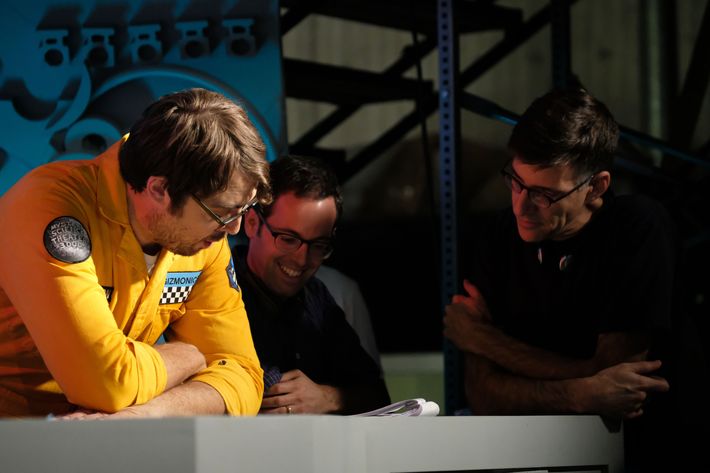
Is there a gap in pop-culture references between you two?
Hodgson: IÔÇÖve noticed the younger generation not only knows all of the stuff that I know, but a whole lot more.
Ray: As IÔÇÖm finding with the stuff that weÔÇÖre writing, [head writer] Elliott Kalan has a certain perspective of our current pop culture, and thereÔÇÖs what I have, and [comedian Hampton Yount] has this innate ability to know about the Kardashians. Not that there are Kardashian jokes, but he just knows about that stuff. [Puppeteer] Baron Vaughn brings another perspective, too. There will be a reference to a ÔÇÖ70s TV-show character, and IÔÇÖll throw in a reference to Hot Fuzz. ItÔÇÖs a great spectrum of time.
Hodgson: When youÔÇÖre a kid, so much of what you see, you donÔÇÖt know. But you still identify with it; you still learn from it. ItÔÇÖs about what you assign meaning to, and thatÔÇÖs how you learn about new things. Somebody pitched a popcorn GIF during one of the shows. And I go, ÔÇ£WhatÔÇÖs a popcorn GIF?ÔÇØ ThatÔÇÖs where people are fighting online, and you put up a popcorn GIF to show that weÔÇÖre really enjoying this fight. ThatÔÇÖs one of the riffs, but I didnÔÇÖt know what it was.
WhatÔÇÖs JonahÔÇÖs character like? WhatÔÇÖs his relationship to the bots?
Ray: Joel was the father figure of the bots ÔÇö he built them. Mike was kind of an older brother. There was a bit more equality between ÔÇÖem. IÔÇÖm like the younger brother of the kid next door. They donÔÇÖt like me, and I hope they do. IÔÇÖm just trying to keep them happy so they donÔÇÖt resent me too much.
Hodgson: HeÔÇÖs new. The thinking is that theyÔÇÖve always been there, and heÔÇÖs just coming into it.
Ray: When I try to belong too much, they scoff at me. ThereÔÇÖs a joke where Tom goes, ÔÇ£We donÔÇÖt know you!ÔÇØ And I say, ÔÇ£IÔÇÖve been here for two months!ÔÇØ So they wonÔÇÖt let it go.
Hodgson: I think their attitude is also: If something happens to him, theyÔÇÖll just put another one up. TheyÔÇÖre not getting too attached.
Ray: Which is generally how I feel on the show anyway.
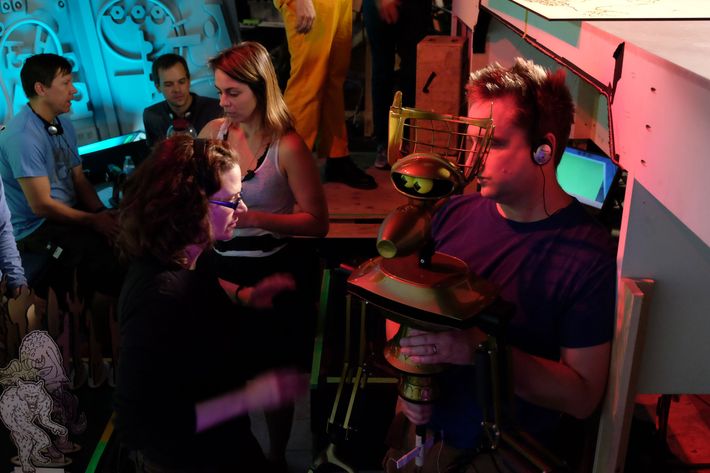
WhatÔÇÖs the greatest challenge of acting alongside puppets?
Ray: When we did the host segments, I would almost try to stay in the scene with the bots. Joel would have to say, ÔÇ£DonÔÇÖt forget, thereÔÇÖs an audience out there and you gotta connect with them.ÔÇØ You have to keep a connection with the audience at home. I had to remember that, because I just wanted to have a conversation with the robots.
Hodgson: Somebody I really trust said that a lot of the success of the show is just looking into the camera and talking to people. ThereÔÇÖs not many shows that do that. ItÔÇÖs a holdout from a kidsÔÇÖ show like BlueÔÇÖs Clues, even though MST is before BlueÔÇÖs Clues. But thereÔÇÖs that kind of directness that they used to do on kidsÔÇÖ show, where IÔÇÖm talking to you, and looking at you. ItÔÇÖs direct.
Does the fact that youÔÇÖre shooting digital affect the number of takes you do?
Hodgson: ItÔÇÖs always been on video, so we never did film. My impression is we always do three takes. In the past, we would usually use the third take. If things are more complicated, weÔÇÖll do more.
Ray: ItÔÇÖs funny, because with so many of the other things I do sketch-wise, you can do as many takes as you need to do and you also have other angles. So if you have four takes and none of them are perfect, you can still cut together a perfect scene. If youÔÇÖre going through [MST3K] and itÔÇÖs going great ÔÇö you get your lines, you did the sleight-of-hand magic trick, you made the prop work ÔÇö and then you mess up a line toward the end, itÔÇÖs best to just try to recover and keep going.
How can you tell if a riff is working? WhatÔÇÖs the veto process like in the writersÔÇÖ room?
Hodgson: One of the secrets of MST is that we never edited in the room. When you write, your job is just to extrude as many riffs as possible. The editing process is done at another time in another room. And thatÔÇÖs based on my understanding of how creativity works. ItÔÇÖs what allowed us to have a writing staff of eight people in Minneapolis, where every two weeks, weÔÇÖd write a new show. The way we were able to do that is that we never edited in front of each other. We never said, ÔÇ£Eh, IÔÇÖm not gonna use your joke. I want you to come up with a better joke.ÔÇØ ThatÔÇÖs forbidden, because it makes you feel bad. It makes you not feel trust.
Ray: And then youÔÇÖll be too scared to say another joke.
Hodgson: My job is to just produce, not edit. ThatÔÇÖs the secret ÔÇö to produce as much as possible. If someone were to edit in front of me in the writing room, they probably wouldnÔÇÖt be working for me very long. I know a lot of writing rooms that do work that way. In L.A., itÔÇÖs really that way.
Ray: Ive been in that situation, where youre in the writers room and youve got to stop yourself. When someones getting an idea, you just kinda go, Ah, well
Hodgson: You donÔÇÖt come back from that, as a creative person. You canÔÇÖt defend a joke. A joke is frail. If someone were to say, ÔÇ£Prove to me that jokeÔÇÖs funny,ÔÇØ IÔÇÖd go, ÔÇ£Fuck you!ÔÇØ I canÔÇÖt. ItÔÇÖs impossible. ItÔÇÖs either funny, or itÔÇÖs not. I think people get trapped into that. I canÔÇÖt tell if itÔÇÖs a cultural thing, or what. But no creative idea can withstand scrutiny, I feel.
Ray: Insult them behind closed doors. When he gets into his ivory tower and starts tearing apart riffs
Hodgson: Oh boy, here he goes.
Ray: ÔÇ£Begone, reference to Fresh Prince of Bel Air, begone!ÔÇØ
This is a heavily scripted show. Do you improv jokes at all?
Hodgson: We call that vamping. Vamping is creating the illusion that itÔÇÖs spontaneous, but itÔÇÖs written. To me, itÔÇÖs like music ÔÇö you have to know who says what or youÔÇÖre gonna crash into each other. At the same time, itÔÇÖs a living, breathing thing. There is room in there to have those moments. But IÔÇÖll say one thing: We didnÔÇÖt put any fake laughs in. The only laughs that are in there are genuine laughs. And I think back in the day there are some fake laughs.
This may be a dumb question, but do you riff when you watch movies at home?
Ray: I turn it off. I feel like my wife turned it on a lot more than she used to once we started. Or maybe I just noticed it because I donÔÇÖt make fun of movies as much out loud.
Hodgson: When itÔÇÖs your job, you donÔÇÖt want to do it. When I go to a movie ÔÇö especially going to a theater ÔÇö youÔÇÖre just like everyone else, you want to get taken into the movie. You want that mysterious, magical thing that allows you to sign off on the movie and just get into it. I always worry about that thing where people are so cynical, assuming theyÔÇÖre gonna riff on a movie. People need movies. We need movies that are good. ItÔÇÖs been part of our culture for over 120 years. To be too cynical about new movies, it worries me.
Ray: Sometimes, though, Rob Schrab will have people over. HeÔÇÖs got all these crazy obscure movies, so we go and thatÔÇÖs really fun. ItÔÇÖs nice when itÔÇÖs low stakes like that.
Hodgson: I agree.
What are your MST3K favorites? Any underappreciated picks?
Hodgson: There are certain ones that I think are really great. Everybody loves Space Mutiny, which is awesome; Final Sacrifice; Werewolf; Mitchell.
Ray: Zombie Nightmare comes up a bunch.
Hodgson: Pod People comes up. Eegah comes up. And I Accuse My Parents! That oneÔÇÖs super-strong, and I didnÔÇÖt really remember it being particularly good. But one day, Drew Carey told me he really liked Mystery Science Theater. I go, ÔÇ£Which one?ÔÇØ And he goes, ÔÇ£I Accuse My Parents is the best one.ÔÇØ I looked at him and go, ÔÇ£You know, he could be right.ÔÇØ
Ray: Nobody ever brings up the movie when they talk about their favorite episodes.
Hodgson: ThatÔÇÖs a really strong riff. The sketches are eh. But the movie riff is strong! In some ways, parts of MST ÔÇö the new MST ÔÇö are more like the movie than the old show, because itÔÇÖs widescreen and we put a little more time into writing them. It might be a closer relative to that.
Ray: And that movie was made with a notes process.
Hodgson: Oh, really?
Ray: They were getting notes back from the studio on the riffs, so I think they had to go through a studio system of riffs from execs who didnÔÇÖt know the show. To think it went through that process, and itÔÇÖs still as strong as it is. I was talking to Kevin Murphy about it, and he said it was awful. He said they started to doubt themselves and wonder, ÔÇ£Are we wrong?ÔÇØ But it turned out great.
Hodgson: ItÔÇÖs really hard to defend jokes. If someone questions you, you go, ÔÇ£LetÔÇÖs just write something else. Because I donÔÇÖt want to sit and defend this. YouÔÇÖve completely taken the fun out of it.ÔÇØ
This interview has been edited and condensed.

